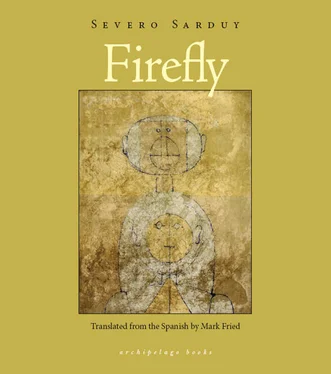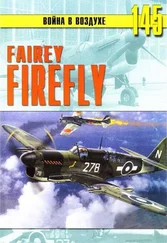Severo Sarduy - Firefly
Здесь есть возможность читать онлайн «Severo Sarduy - Firefly» весь текст электронной книги совершенно бесплатно (целиком полную версию без сокращений). В некоторых случаях можно слушать аудио, скачать через торрент в формате fb2 и присутствует краткое содержание. Год выпуска: 2013, ISBN: 2013, Издательство: Archipelago Books, Жанр: Современная проза, на английском языке. Описание произведения, (предисловие) а так же отзывы посетителей доступны на портале библиотеки ЛибКат.
- Название:Firefly
- Автор:
- Издательство:Archipelago Books
- Жанр:
- Год:2013
- ISBN:9781935744917
- Рейтинг книги:3 / 5. Голосов: 1
-
Избранное:Добавить в избранное
- Отзывы:
-
Ваша оценка:
- 60
- 1
- 2
- 3
- 4
- 5
Firefly: краткое содержание, описание и аннотация
Предлагаем к чтению аннотацию, описание, краткое содержание или предисловие (зависит от того, что написал сам автор книги «Firefly»). Если вы не нашли необходимую информацию о книге — напишите в комментариях, мы постараемся отыскать её.
Firefly — читать онлайн бесплатно полную книгу (весь текст) целиком
Ниже представлен текст книги, разбитый по страницам. Система сохранения места последней прочитанной страницы, позволяет с удобством читать онлайн бесплатно книгу «Firefly», без необходимости каждый раз заново искать на чём Вы остановились. Поставьте закладку, и сможете в любой момент перейти на страницу, на которой закончили чтение.
Интервал:
Закладка:
The lamp in the office was still on, the window a yellow rectangle cut from the purple night. The four silhouettes remained frozen in the position in which he had left them, no gestures, no movement.
All of a sudden, with the abruptness of a swat, Munificence shattered the immobility of that wax museum. She had thrown something in Gator’s face; something had struck him, wounded him, perhaps a glass. The herbalist put his hands to his face, to his mouth, as if trying to staunch the blood. Isidro approached with what looked like a handkerchief. Then they rushed out. Gator, one hand still pressed to his mouth, hung on to the fat man’s arm with the other.
Ada and Munificence sat down across from each other, the tutor in a higher chair, where she looked to be in charge.
Firefly, liberated by the departure of the visitors, ran to the offices. He panted up the staircase. He knocked on the office door. No answer. Cautiously, slowly, he pushed it open. He peeked inside.
“Have the men gone?” he asked, flushed, bathed in a sudden sweat.
“The men?” Munificence asked back, surprised. “What men? No man has come here. Besides,” and she slayed him with a reproachful look, “you’re drunk. Utterly, completely drunk.”
And she shook him by the shoulders to bring him back to his senses.
He does not know what happened next. Nor where he spent the night. He awoke back in the yard. His hair was wet. To sober him up, someone had dunked his head in the fishpond. He guessed the time by the height of the sun and the noise of typewriters in the offices: twelve noon.
The owl took off from the top of the ceiba tree and rose vertically, wings spread, white symmetry in the whitened midday sky, and after several ever-expanding circles took refuge in its daytime hideout, the bell tower of the cathedral.
Amid damp green-and-yellow pyramids of freshly woven baskets, the Gypsies were cooking their lunch of dense phyllo pastries stuffed with olives.
Had he dreamed it all, like the white wooden house by the sea, like the phosphorescence of the lightning bugs above the sand? Was it simply delirium, a trumped-up story both gratuitous and meticulous, contrived by drink? Or were they fooling him again, making fun of him, callously playing with his frailty? But why?
He decided to search on the sly for some clue, some trace, convinced that if the visitors had been real they must have left a mark. Likely more than one, since the assault he half saw had seemed so real.
He perceived — but it was immaterial, indemonstrable — the dark emanation of the events like the tenuous impalpable shadow that remains in a room after a crime and which no one can point to but some people find unbearable.
Quietly he climbed the stairs to the office illuminated the night before. He was welcomed, as usual, by a fat-cheeked lawyer wearing blue-tinted bifocals and a gold watch chain, holding his head in his hands, either the victim of a migraine or lost in the twists and turns of some extortion.
“A café con leche really hot and a ham-and-cheese sandwich,” the man yelled at once. And he angrily pounded a yellowed document with a sealing-wax stamp, as if he meant to punch a hole right through it.
Firefly did not obey the order; on the contrary, he advanced a few steps toward the center of the office, observing everything, scrutinizing each object, searching for a sheaf of papers out of place, a fold in the rug, a sliver of glass. There was nothing.
“Why aren’t you on your way?” the lawyer scolded. “Are you in limbo or what the hell’s wrong with you?” Then suddenly changing his tone, he chuckled. “Ah, I forgot. My mind’s somewhere else.”
He held out a one-peso note.
Firefly left the office. His eyes scoured the floor. He heard them summoning him with a bell and with shouts from the other offices. But he paid no heed; he did not even go for the litigator’s order.
He was looking for a sign. More: for proof of his sanity.
Repeatedly, he went up and down the stairs. He combed the mezzanine. He returned, under the pretext that they had no change, to the scene where it all supposedly occurred. Nothing. And yet.
Disheartened and exhausted, he was about to give up the search and accept it was just alcohol playing tricks or mind-games spun by his imagination. He was ready to sink to the floor in tears, ready to head back to the yellow cupboard, when amid the chaos of the threadbare furniture on the first floor, on the leather of an easy chair people had to brush past to get to the door, he found, still fresh, no older than a night, a trickle of blood .
Now everything seemed linked, definitive: overlapping causes connected to consequences by indestructible bonds, like animals devouring and regurgitating one another from now until the ultimate extinction. Everything was crystal clear. Yet by late afternoon doubts accosted again him. Maybe it had been he himself, drunk, who had been wounded? Maybe the blood was old? With the same minute care with which he had scrutinized the office, he inspected his body in the mirror, millimeter by millimeter, an archaeologist of his own skin.
Nothing.
The following day he took to drink once more.
And the day after that.
At first he fixed the yellow cupboard so Munificence would not notice the break-in, and he doctored the crème , reducing its alchemy with equal measures of harsh rum and condensed milk, but found it insipid and repugnant and stopped straightaway. Then, with his morning coffee he would search the pantry for bottles of beer he could hide among the dockets and then sip bit by bit in furtive paper cups between his hurried and irritating errands.
At six in the afternoon, when the notaries abandoned their cubicles, he would leisurely take the last warm sips and begin to ruminate on Ada and the interloping quacks. Paper cup in hand, he would go down into the yard and stand next to the fishpond by the gate that led to the basket workshop. He would watch the Gypsies weave in silence, eat standing up, and on Sundays and after baptisms (they were believers and prolific) sing and dance, lifting their colorful ruffled skirts, clapping their hands, and stamping their heels. He watched them through the wrought iron, their arms raised very high to sketch arabesques, their bodies stretching and twisting as if they yearned to catch fire. Everything they did seemed to be one big party, cante jondo, heralds of Ada, rum, deep cool breaths that reached the bottom of his lungs, imminence of definitive departure, the red and gold of the waving skirts, the white of the baggy sleeves, the silver of the Moorish bracelets. And the gravelly voice, the voice of rum, and the arms reaching up so the hands could scribble on the sky.
Everything was a party. Yet in those inaccessible songs, in the scratchy voices worn by alcohol and the waning light of afternoon, he thought he heard something from his childhood, from the time when people nailed the doors shut to keep out the screams of the spirits: the innocent children, throats slit by the Inquisition, back with their interminable wailing, their voices rent but recognizable. For the voice is the only thing that remains intact after death.
HAVEN’T YOU EVER SEEN A BAT SMOKE?
Firefly tried to forget that inopportune visit or chalk it up to his imagination or to drink. Now he could enter and leave his office hideaway whenever he wished: He had his own key and was in charge of the door bolts. His voice was still high-pitched like a bamboo flute, but rubbing his sex against the silk of the recamier now shook him from tip to toe and did not end dry like before. Upon rising, he would pull a page from one of the files, crumple it in his hand, and wipe up the white stain.
Of the outside world, he was now familiar with Plaza del Vapor, the rooming houses painted indigo, mustard, and green under the royal poincianas with their tentacle roots. He knew a bird shop where an old man in thick glasses trained canaries and the window of a crippled woman who painted piggy banks. He could also distinguish the aromas of a Chinese restaurant, of the talcum women wore, and of fresh-cut wood from a sawmill, which was his favorite — it was like sharpening a pencil. He knew where they sold oysters in little cups, where there was a blue lamp, always lit, shining on women who never sat down.
Читать дальшеИнтервал:
Закладка:
Похожие книги на «Firefly»
Представляем Вашему вниманию похожие книги на «Firefly» списком для выбора. Мы отобрали схожую по названию и смыслу литературу в надежде предоставить читателям больше вариантов отыскать новые, интересные, ещё непрочитанные произведения.
Обсуждение, отзывы о книге «Firefly» и просто собственные мнения читателей. Оставьте ваши комментарии, напишите, что Вы думаете о произведении, его смысле или главных героях. Укажите что конкретно понравилось, а что нет, и почему Вы так считаете.












